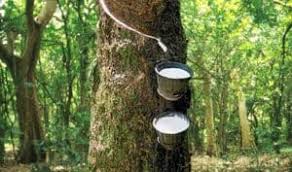
Ghana’s rubber industry is facing an escalating crisis as illegal exports continue to drain raw materials from local processing factories, threatening the country’s industrialization ambitions and costing the economy millions of dollars each year.
Emmanuel Akwasi Owusu, Chairman of the Rubber Processors Association of Ghana (RPAG), warned that uncontrolled raw rubber exports are depriving domestic processors of critical inputs, despite their capacity to absorb the nation’s entire output.
“Foreign companies are exploiting Ghana’s low raw rubber prices to their benefit, while Ghana loses out on jobs and revenue,” he said in a recent television interview.
The crisis persists despite explicit directives from the Tree Crops Development Authority (TCDA). Effective May 2, 2025, the TCDA mandated that anyone intending to export unprocessed rubber must first obtain a written permit under Regulation 50 of Legislative Instrument 2471.
However, enforcement remains weak, allowing a steady flow of unapproved exports that undermine local processors and expose gaps in regulatory oversight.
The financial implications are significant. While Ghana earned US$98 million from rubber processing in 2024, industry sources estimate the country could have captured up to US$160 million had all locally produced rubber been processed domestically.
The illegal export market is believed to cost Ghana roughly $100 million annually.
The domestic sector currently operates seven rubber processing companies, though one has collapsed and another has yet to begin operations due to persistent raw material shortages.
Ghana Rubber Estates Limited (GREL), the largest processor, controls 98 percent of the market with an annual capacity of 90,000 tonnes, expandable to 140,000 tonnes. Owusu stressed that domestic factories have sufficient capacity to process all locally produced rubber, and that enforcement, rather than production capability, is the main obstacle.
The TCDA has initiated awareness programs and stakeholder engagements to tackle the problem, emphasising that Regulation 50 prioritises local supply. Nevertheless, Western Region authorities and the Association of Natural Rubber Actors of Ghana (ANRAG) are urging stronger enforcement to secure raw material access for domestic processors.
Beyond immediate industry concerns, experts argue that controlling raw rubber exports is crucial for job creation, technology transfer, and boosting Ghana’s value-addition strategy. Without decisive action, the country risks losing its competitive edge in the global rubber market, undermining broader industrial development objectives and missing out on higher-value economic opportunities.
The coming months will test the TCDA’s ability to enforce its directives and determine whether Ghana’s rubber industry can thrive as a key pillar of national industrialisation or continue bleeding resources to unregulated foreign markets.



